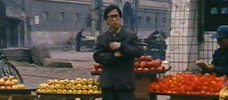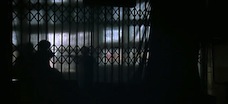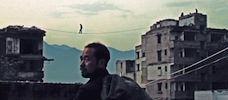Credits
Feature by: Rumsey Taylor, Leo Goldsmith, Jonathan Foltz, and Michael Nordine
Posted on: 23 May 2011
On Saturday, May 28th, Not Coming to a Theater Near You will be presenting a rare screening of Jia Zhangke’s 2007 documentary, Useless. In anticipation of this screening, we offer reviews of all of Jia’s features. For more information on the screening, please visit 92Y Tribeca’s website.
Last month’s announcement that China’s State Administration for Radio, Film & Television would officially discourage the production of TV dramas with time travel as a theme struck many in the West as only the most whimsical in an ongoing series of curious dicta from the People’s Republic. But for a country in the throes of a rapid economic expansion and a strange, schizoid condition of free markets and less-than-free speech, the censure makes a good deal of sense. After all, time travel entails a degree of dialogue with history, a sense that events needn’t have transpired as they did, or that things yet might turn out differently. Missed opportunities and second chances are unwelcome subjects for a nation that seems eager to barrel ahead in a rigid forward trajectory of reform.
The Chinese government’s problem with time travel is, in this sense, indicative of the perpetual difficulty that all nations have with shoring up their historical narratives. For over two decades now – since the end of the Mao era, the 1989 protests in Tiananmen Square, and Deng Xiaoping’s 1992 “Southern campaign” to foster economic transformation – it seems like China has been engaged in its own form of time management: bulldozing the past to make way for a thoroughly modernized future. But what often gets lost in this forward momentum is the material, contingent present—the inexorable linearity of the nation’s timeline affords little time for reflection on the present moment and those who might be caught up in it.
Few have captured the arc of this often brutal, lumbering drive to progress better than the filmmakers who came to be known as the “Urban Generation.” This now somewhat outmoded designation, derived from a 2001 program of their work at Film Society of Lincoln Center, suggests that geographic space is as crucial here as temporality. Capturing the turn of Chinese cinema away from the idealized rural and historical subjects of the Fifth Generation (filmmakers like Chen Kaige and Zhang Yimou, and films like Yellow Earth, Farewell My Concubine, and Raise the Red Lantern, amongst others), these new filmmakers took the contemporary Chinese city as their locus, following the path of rural inhabitants who fled there to find work.
Professionally and thematically, this was Jia Zhangke’s path, too—indeed, he has even embraced his designation as a “mingong daoyan,” or “migrant-worker director.” Born in a small town in the poor northern coal-mining province of Shanxi to a lower middle class family, Jia spent his early years as a break-dancer in a traveling dance troupe (inspired by the American movie Breakin’, and an experience which in turn inspired his 2000 film, Platform), later moving to the nation’s capital to attend classes at the Beijing Film Academy in an attempt to insinuate himself into the often-elitist film industry. Jia’s own experience thus matches those of the characters in many of his films: still lives caught between country and city, frozen between past and future.
In many respects, this is an experience common to many of his contemporaries, which include narrative filmmakers like Zhang Yuan (Mama, Beijing Bastards), Wang Xiaoshuai (The Days, Frozen, Beijing Bicycle), and Lou Ye (Suzhou River, Purple Butterfly), and documentary filmmakers like Jiang Yue (The Other Bank), Wu Wenguang (Bumming in Beijing, Jiang Hu: Life on the Road), and Wang Bing (Tie Xi Qu: West of the Tracks). Under a new banner of amateur cinema (yeyu dianying), even the concept of numbered “generations” – structured around graduating classes from the BFA – dissolved in an industry newly electrified by Tiananmen Square and with the advent of digital video, which afforded these filmmakers the chance to circumvent the nepotism and censorial restrictions of the official culture of the People’s Republic.
The confluence of changes – both social and technological – in China after the 1989 protests have also affected cinema: at the level of production, with the availability of prosumer digital video equipment and the rise of independent community video projects; distribution, with markets for DVD and VCD pirating and increased access to (and increased interest from) foreign film festivals; and exhibition, through the country’s many budding cine-clubs. All of this represents a process of reclaiming what has long been a tightly controlled medium in China from officials and censors – and, increasingly, private business interests – and of repurposing cinema as a weapon for social justice, human rights, and the preservation of threatened ways of life. In this regard, the work of the so-called Urban Generation and those who’ve followed them exceeds the delineation of city and country, focusing instead on the often-voiceless Chinese population, subsumed in processes of rapid economic expansion in a post-socialist nation undergoing a capitalist face-lift.
But this is not to say that all of these filmmakers represent an “underground” of Chinese cinema, or even necessarily a wholly independent one. These filmmakers find diverse sources of funding – through foreign channels as well as domestic ones – and notwithstanding the lot of dissident artist Ai Weiwei, the sexy-sounding designation of “banned in China!” is something of a simplification of nonetheless restrictive filmmaking conditions. More often than not, filmmakers have managed to find ways of working with, if not around, authorities in order to continue working. This was one of the original reasons for the recent boom in documentary production in China: as they were “merely” documenting reality, early DV filmmakers like Wu Wenguang and Jiang Yue didn’t have to present a screenplay or detailed prospectus to authorities for approval before filming.
With fiction filmmaking, the matter is somewhat more complex, making Jia’s achievement that much more interesting—if also ambiguous, or even controversial. Since 2004’s The World, Jia’s films have been officially approved by the state, a fact that didn’t seem to dull what is, at heart, a rich and trenchant critique of China’s rush to globalization and the ordinary people crushed in the stampede. But then, Jia’s films are never transparent in their ideology; they explicitly eschew the heavy-handed social realism of Maoist-era cinema for Bazinian long-take realism of European art cinema. And while his sources of funding – some of his films have been commissioned by domestic and international companies, and even official organizations – could contribute to the perception of the filmmaker as a sell-out, his style has remained slippery, weaving defiantly between narrative and documentary, science fiction and social critique, public record and personal reminiscence.
Jia’s vision of China is both a gritty appraisal of a lurching economy and massively destabilizing reconstruction projects, and a phantasmagoria of the intimate desires of its ordinary citizens. Documentary realism vies with the simulacra of contemporary life: cellphone daydreams explode in flash animation, UFOs rise above the Three Gorges Dam project, everyday banalities mix alchemically with the glimmering seductions of popular culture. Jia’s is a cinema of contradictions, of fact against fiction, of bitter memory against the utopias of post-socialism. But most of all, it’s defiantly a cinema of the present—not a forecast of the glories of the China to come, but an ode to a receding present moment scarred by history and yet bristling with anticipation—and a little hope.
By Rumsey Taylor, Leo Goldsmith, Jonathan Foltz, and Michael Nordine ©2011 NotComing.com
Reviews
-

Xiao Wu
1998 -

Unknown Pleasures
2002 -

The World
2004 -

Useless
2007 -

Still Life
2006 -

Dong
2006 -

24 City
2008
We don’t do comments anymore, but you may contact us here or find us on Twitter or Facebook.



